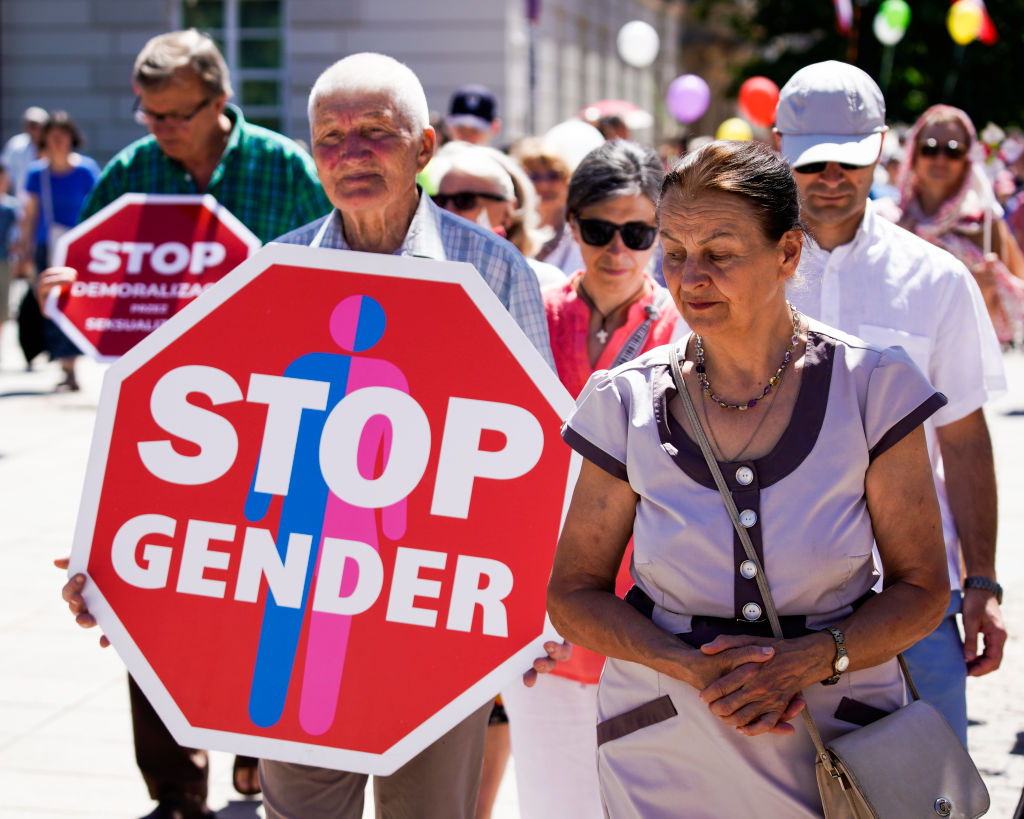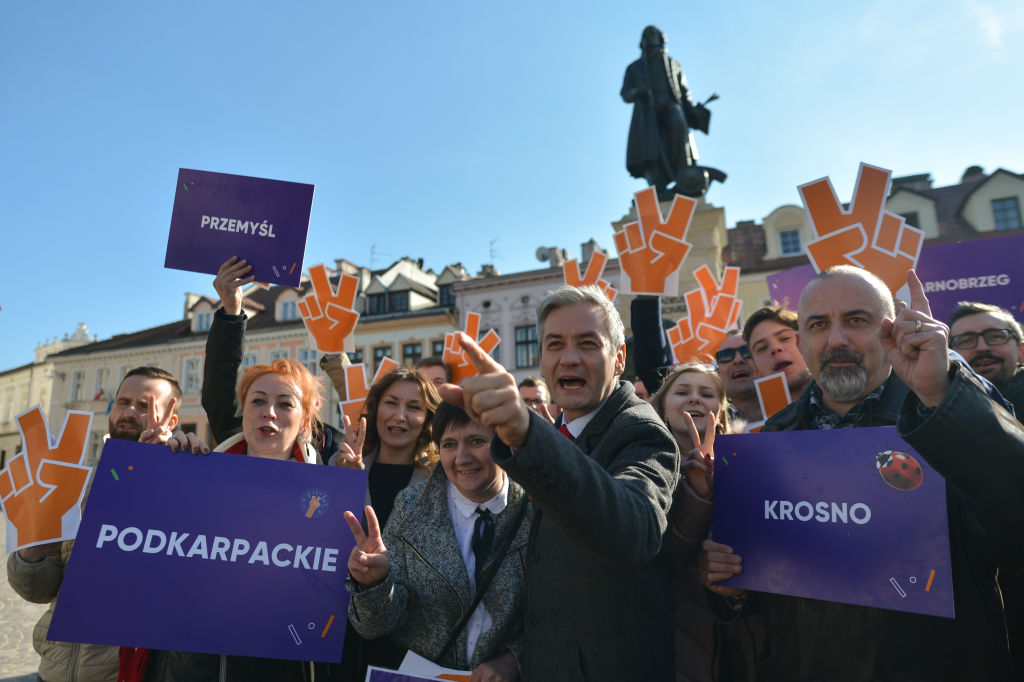
The biggest pride event in Central and Eastern Europe brought more people than ever to the streets in the Polish capital of Warsaw on June 8. Tens of thousands of people marched, danced and sang waving colorful flags and umbrellas. Back in 2005, gay rights activists had to fight to march in Warsaw. Pride events were officially banned in 2004 and 2005 by then mayor Lech Kaczynski, who later became President.
What started as hundreds of people marching in defiance of the mayor, grew to nearly 50,000 marching in June alongside the new mayor, who was elected in 2018. In June, Rafal Trzaskowski became the first mayor to take part and speak to crowds from a parade float in Warsaw, which is Poland’s largest city with a population of 1.76 million people. And in at least 20 cities across Poland from June 29 to July 6, Equality Parades have taken place, including in the western city of Poznan, with more people than ever taking part.
But as support for LGBTQ rights has grown, so too has the backlash. Ahead of European Parliament elections in May, Poland’s right-wing ruling Law and Justice party (PiS), ramped up its opposition to the LGBTQ community, calling it a “direct attack” on family values. PiS, which has been in power since 2015, warned that if the opposition prevailed in the European Parliament elections, so would the LGBTQ “attack” on society (PiS eventually scored a victory in the May elections). Jacek Kucharczyk, President of Poland’s leading think tank, the Institute of Public Affairs tells TIME he expects anti-LGBTQ rhetoric to increase ahead of national elections this fall.
What challenges do LGBTQ citizens face in Poland?
Poland, home to some 38 million people, is one of Europe’s most Catholic countries, with about 86 percent of the population identifying as Roman Catholic. It ranks 27 out of 28 European Union states when it comes to equality and non-discrimination, according to Rainbow Europe, an organization linked to the International Lesbian, Gay, Bisexual, Trans and Intersex Association.
Same-sex marriage, still illegal in Poland, is legal in 27 EU countries. Anti-gay attacks are not considered a hate crime by law. In 2016, parliament rejected a bill that would have included gender, gender identity, sexual orientation, disability, and age as potential grounds for a “hate crime.” Kucharczyk from the Institute of Public Affairs says there’s a “refusal to recognise that LGBTQ people need to be protected. This group is systematically excluded. Hate crimes against sexual minorities are not reported because police aren’t required to report it.”
According to the Campaign Against Homophobia, 12 percent of people who don’t identify as heterosexual are victims of physical violence in Poland, while around ninety percent of incidents go unreported, according to the 2016 survey.
Nevertheless, “attitudes towards the LGBTQ community have come a long way” says Robert Biedron, who became Poland’s first openly gay and atheistic politician when he came out in 2011. Biedron, 42, served as mayor of the northern town of Slupsk until 2018. He cites the rising number of pride demonstrators and the fact that he now endures far fewer anti-gay insults from politicians and the media. “It’s a big change compared to a few years ago,” he says. In February Biedron founded a pro EU political party, which has vaulted into third place in a public opinion poll, potentially threatening the ruling party’s prospects for winning the general election.

Why are Poland’s populists targeting LGBTQ rights?
Opposition to LGBTQ rights became a cornerstone of PiS’s campaign after Warsaw Mayor Trzaskowski, who belongs to opposition party Civic Platform, signed a declaration in February that promised an LGBTQ hostel and community centre, a local crisis intervention system, and access to anti-discrimination and sex education in schools along World Health Orgnization (WHO) guidelines.
Shortly after the mayor signed the declaration, PiS leader Jaroslaw Kaczynski responded, calling LGBTQ rights an “import” that threatens the very continuation of the Polish state. A number of town councillors announced their decision to make their municipalities “LGBT free”, calling Warsaw’s declaration “against good moral values”. Mirosława Makuchowska, from the Campaign Against Homophobia, says while such announcements are not legally binding, they send a “disturbing message” to the population.
Others have noted the desire to get political mileage out of an inflammatory issue. Biedron, Poland’s first openly gay politician, says PiS are “looking for a scapegoat and are exploiting people’s sense of security. They’re trying to turn public attention away from the real problems to the imaginary problems.” Makuchowska says she sees parallels with the party’s 2015 campaign, when it deployed anti-immigrant rhetoric. “Now they’ve picked a new theme,” she says.
While PiS’s popularity has slightly declined in the past year, it’s still the most popular party amid robust economic growth, low unemployment and large social benefits. Nevertheless, there are very real problems. “The party is worried about losing its legitimacy at home due to a series of recent scandals” says Kucharczyk, the think-tank analyst. Local media has accused the party of running a murky real estate business, as well as corruption at the financial market regulatory authority, charges PiS denies.
How has Polish media influenced anti-gay rhetoric?
Anti-LGBT rhetoric is not only seen in politics; it’s increasingly used in Polish media. As Biedron puts it, “Polish people have long been surrounded by information saying that homosexuality is a disease that can cause brain damage.”
A 2017 report by the Centre for Research on Prejudice of the University of Warsaw found that since PiS entered government in 2015, Polish population’s exposure to hate speech in the media, including against gay people, has increased by 25%. The report states that hate speech is “particularly dangerous for youth,” who were found to use hate speech most often and whose “sensitivity to homophobic statements” decreased. More than 40% of young people said they had used hate speech against gay people and refugees.
On the eve of the Warsaw’s pride parade, a television presenter, Rafal Ziemkiewicz, an author and journalist tweeted “one must shoot at LGBT” people, before adding “not in the literal sense of course — but these are not people of good will or defenders of anybody’s rights, [the movement is] a new mutation of Bolsheviks and Nazis.”

Are any other European governments becoming increasingly anti-LGBTQ?
Poland’s anti-LGBTQ rhetoric chimes with other conservative populists, including Hungary’s Prime Minister Viktor Orban. His Fidesz party has advocated the defense of traditional family values against the rise of dangerous and imported values — including LGBT rights — that threaten the country’s Christian roots.
One member of Budapest Pride, which organizes pride events, Viktória Radványi, tells TIME that “in spite of the growing number of people joining equality marches, homophobia in the government and the press has increased over the past few months.” During a Budapest forum on May 15 as part of the European elections campaign, a Fidesz member and Chair of the National Assembly Laszlo Kover, said there was “no moral difference” between pedophiles and gay couples adopting children.
Fabrice Houdart, Human Rights Officer at the United Nations told the Economist that “increasingly LGBT people are used as pawns for political gain around issues of family and tradition.” He added that the “widening gap” between the quality of the lives of LGBT people in more tolerant places and in the rest of the world is not sustainable. “LGBT people everywhere know that they deserve the same opportunities and the same level of dignity as everyone else,” he said.
What’s the future of LGBTQ rights in Poland?
Biedron, who suffered four anti-gay physical assaults when he served as a Member of Parliament from 2011 to 2014, says “the distance between hate speech and hate crime is small.” He believes the best way to counteract anti-gay sentiment is to “explain to the public that who we’re talking about when we talk about LGBT people.” But with the PiS’s opposition to implementing education programs, young people will continue to have limited access to information related to LGBTQ people.
While Biedron says that anti-LGBTQ rhetoric is likely to only intensify ahead of national elections in the fall, he’s hopeful that civil society can fight back. “Even if you have politicians, full of hate and stereotypes, scapegoating LGBTQ people, it’s clear that part of society is not buying this story.” Fifteen years ago, he says, it was “unimaginable” that Warsaw, Poland’s most “progressive city,” would host a pride march — let alone in other cities. “More people are brave enough to go on the streets and demand equal rights” says Biedron, “and this is the hope for Poland.”
More Must-Reads from TIME
- Cybersecurity Experts Are Sounding the Alarm on DOGE
- Meet the 2025 Women of the Year
- The Harsh Truth About Disability Inclusion
- Why Do More Young Adults Have Cancer?
- Colman Domingo Leads With Radical Love
- How to Get Better at Doing Things Alone
- Michelle Zauner Stares Down the Darkness
Contact us at letters@time.com